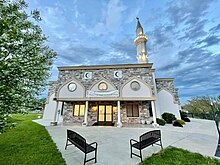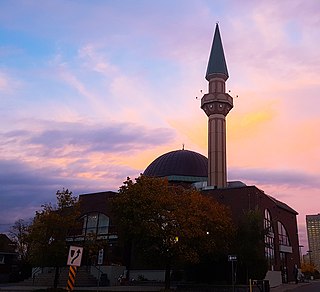
Islam in Canada is a minority religion practised by approximately 5% of the population. A majority of Muslims are of immigrant backgrounds consisting a diverse range of ethnic groups. Muslims have lived in Canada since 1871 and the first mosque was established in 1938. Most Canadian Muslims are Sunni, while a significant minority are Shia.

Islam's significance in Germany has largely increased after the labour migration in the 1960s and several waves of political refugees since the 1970s.

Islam is the largest religion practiced in Kazakhstan, with estimates of about 74% of the country's population being Muslim. Ethnic Kazakhs are predominantly Sunni Muslims of the Hanafi school. There are also small numbers of Shias. Geographically speaking, Kazakhstan is the northernmost Muslim-majority country in the world, and the largest in terms of land area. Kazakhs make up over half of the total population, and other ethnic groups of Muslim background include Uzbeks, Uyghurs and Tatars. Islam first arrived on the southern edges of the region in the 8th century from Arabs. According to the Constitution, The Republic of Kazakhstan proclaims itself as a democratic, secular, legal and social state whose highest values are a person, his life, rights, and freedoms.

KDHX is an independent, non-commercial, listener-supported community radio station in St. Louis, Missouri, United States offering a full spectrum of music along with cultural and public affairs programming since 1987. KDHX broadcasts 24 hours a day online and with 42 kW of effective radiated power in stereo with RBDS data.

The Barelvi movement, also known as Ahl al-Sunnah wa'l-Jamaah is a Sunni revivalist movement that generally adheres to the Hanafi and Shafi'i schools of jurisprudence, and Maturidi and Ash'ari schools of theology with hundreds of millions of followers, and it encompasses a variety of Sufi orders, including the Chistis, Qadiris, Suhrawardis and Naqshbandis as well as many other orders of Sufism. They consider themselves to be the continuation of Sunni Islamic orthodoxy before the rise of Salafism and Deobandi movement.

Islam is the most widespread religion in Bosnia and Herzegovina. It was introduced to the local population in the 15th and 16th centuries as a result of the Ottoman conquest of Bosnia and Herzegovina.
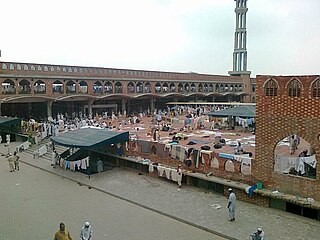
Raiwind is a town located within union council 149 (Dholanwal) in Allama Iqbal Town of Lahore, Punjab, Pakistan. The town serves as the headquarters of Tablighi Jamaat and hosts the annual Raiwind Markaz Ijtema. Raiwind is also home to Pakistan Railways Junction and Railways Track Workshop and serves as the political base for former Prime Minister Nawaz Sharif.
The Majlis Ugama Islam Singapura (MUIS), also known as the Islamic Religious Council of Singapore (IRCS), is a statutory board of the Ministry of Culture, Community and Youth of the Government of Singapore. As a majlis, its role is to look after the administration and interests of Singapore's Muslim community. The Majlis is headed by a Council, in which members are appointed by the President of Singapore. Since 2009, the council is headquartered in the Singapore Islamic Hub, along Braddell Road.

Islam is the second largest religion in Norway after Christianity. As of 2023, the number of Muslims living in Norway was 182,607. The majority of Muslims in Norway are Sunni, with a significant Shia minority. 55 percent of Muslims in the country live in Oslo and Viken. The vast majority of Muslims have an immigrant background, and very few Norwegians are Muslim.
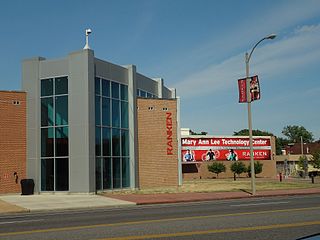
Ranken Technical College is a private technical school in St. Louis, Missouri. It offers programs in five main divisions: Automotive, Electrical, Construction, Information Technology, and Manufacturing. The school has a student body consisting of approximately 2,300 students.

The Muslims in Slovenia are ethnically mostly Bosniaks and ethnic Muslims. In 2014, there were 48,266 Muslims in Slovenia, making up about 2 percent of the total population. The Muslim community of Slovenia is headed by Nedžad Grabus. There are also a few Muslim migrant workers from Central Asia; however, they are not counted in the census, because they are not citizens of Slovenia.
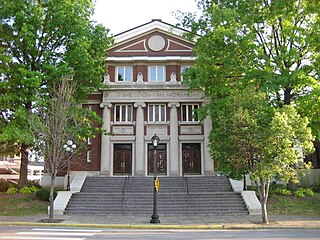
The Sheldon, designed by the noted 1904 World’s Fair architect Louis C. Spiering, was built in 1912 as the home of the Ethical Society of St. Louis. Musicians and public speakers throughout the years have enjoyed the perfect acoustics of The Sheldon Concert Hall, earning The Sheldon its reputation as "The Carnegie Hall of St. Louis." Well-known singers and ensembles have performed at The Sheldon, and speakers such as Margaret Mead, Thurgood Marshall and Martha Gellhorn have spoken from its stage. The St. Louis Chapter of the League of Women Voters was founded in The Sheldon’s Green Room.

The Islamic Foundation of Greater St. Louis (IFGSTL) is an Islamic organization composed of two mosques. The first mosque, Masjid Bilal, is located in midtown St. Louis, on W Pine Blvd, next to the campus of Saint Louis University. The second and larger mosque, Daar-Ul-Islam, is located in Ballwin, Missouri, at 517 Weidman Road, and includes an Islamic funeral home with 5 cemeteries and social services including job training and English classes. A donation charity known as Baitulmal that provides donated items and food to those in need is also hosted by IFGSTL.
Bosnian Americans are Americans whose ancestry can be traced to Bosnia and Herzegovina. The vast majority of Bosnian Americans immigrated to the United States during and after the Bosnian War which lasted from 1992–95. Nevertheless, many Bosnians immigrated to the United States as early as the 19th century. The largest Bosnian-American population can be found in both Greater St. Louis and in Greater Chicago which boast the largest number of Bosnians in the world outside Europe.

The most widely professed religion in Bosnia and Herzegovina is Islam and the second biggest religion is Christianity. Nearly all the Muslims of Bosnia are followers of the Sunni denomination of Islam; the majority of Sunnis follow the Hanafi legal school of thought (fiqh) and Maturidi theological school of thought (kalām). Bosniaks are generally associated with Islam, Croats of Bosnia and Herzegovina with the Roman Catholic Church, and Bosnian Serbs with the Serbian Orthodox Church. The State Constitution of Bosnia and Herzegovina (BiH) and the entity Constitutions of the Federation of Bosnia and Herzegovina and the Republika Srpska provide for freedom of religion, and the Government generally respects this right in ethnically integrated areas or in areas where government officials are of the majority religion; the state-level Law on Religious Freedom also provides comprehensive rights to religious communities. However, local authorities sometimes restricted the right to worship of adherents of religious groups in areas where such persons are in the minority.

Jami Mosque is a mosque in Toronto, Ontario, Canada. Located just east of High Park, it is the oldest Canadian Islamic centre in the city and dubbed "the mother of all the mosques in Toronto".

The Mosque Foundation is located in Bridgeview, Illinois, in the Chicago metropolitan area.

The city of Chicago, Illinois, is tied with St. Louis for largest Bosnian-American population and the largest number of Bosnians outside of Europe, The largest concentration of Bosnians in Chicago live on the North Side.

The Islamic Society of Greater Houston (ISGH) is a system of mosques in Greater Houston. It is headquartered at the Eastside Main Center in Upper Kirby in Houston.
